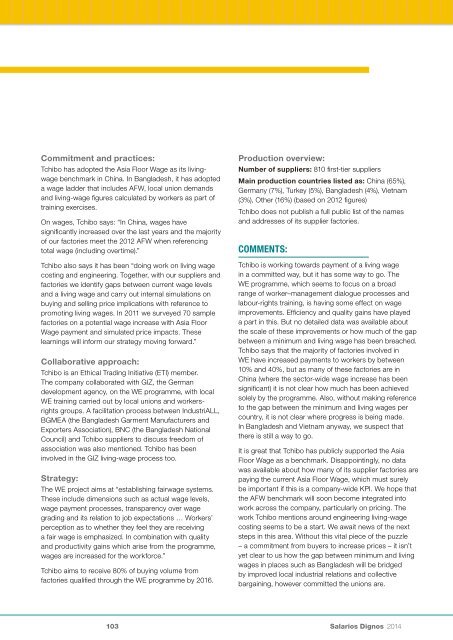17Investigación SALARIOS dignos definitiva
17Investigación SALARIOS dignos definitiva
17Investigación SALARIOS dignos definitiva
Create successful ePaper yourself
Turn your PDF publications into a flip-book with our unique Google optimized e-Paper software.
Commitment and practices:<br />
Tchibo has adopted the Asia Floor Wage as its livingwage<br />
benchmark in China. In Bangladesh, it has adopted<br />
a wage ladder that includes AFW, local union demands<br />
and living-wage figures calculated by workers as part of<br />
training exercises.<br />
On wages, Tchibo says: “In China, wages have<br />
significantly increased over the last years and the majority<br />
of our factories meet the 2012 AFW when referencing<br />
total wage (including overtime).”<br />
Tchibo also says it has been “doing work on living wage<br />
costing and engineering. Together, with our suppliers and<br />
factories we identify gaps between current wage levels<br />
and a living wage and carry out internal simulations on<br />
buying and selling price implications with reference to<br />
promoting living wages. In 2011 we surveyed 70 sample<br />
factories on a potential wage increase with Asia Floor<br />
Wage payment and simulated price impacts. These<br />
learnings will inform our strategy moving forward.”<br />
Collaborative approach:<br />
Tchibo is an Ethical Trading Initiative (ETI) member.<br />
The company collaborated with GIZ, the German<br />
development agency, on the WE programme, with local<br />
WE training carried out by local unions and workersrights<br />
groups. A facilitation process between IndustriALL,<br />
BGMEA (the Bangladesh Garment Manufacturers and<br />
Exporters Association), BNC (the Bangladesh National<br />
Council) and Tchibo suppliers to discuss freedom of<br />
association was also mentioned. Tchibo has been<br />
involved in the GIZ living-wage process too.<br />
Strategy:<br />
The WE project aims at “establishing fairwage systems.<br />
These include dimensions such as actual wage levels,<br />
wage payment processes, transparency over wage<br />
grading and its relation to job expectations … Workers’<br />
perception as to whether they feel they are receiving<br />
a fair wage is emphasized. In combination with quality<br />
and productivity gains which arise from the programme,<br />
wages are increased for the workforce.”<br />
Tchibo aims to receive 80% of buying volume from<br />
factories qualified through the WE programme by 2016.<br />
Production overview:<br />
Number of suppliers: 810 first-tier suppliers<br />
Main production countries listed as: China (65%),<br />
Germany (7%), Turkey (5%), Bangladesh (4%), Vietnam<br />
(3%), Other (16%) (based on 2012 figures)<br />
Tchibo does not publish a full public list of the names<br />
and addresses of its supplier factories.<br />
COMMENTS:<br />
Tchibo is working towards payment of a living wage<br />
in a committed way, but it has some way to go. The<br />
WE programme, which seems to focus on a broad<br />
range of worker–management dialogue processes and<br />
labour-rights training, is having some effect on wage<br />
improvements. Efficiency and quality gains have played<br />
a part in this. But no detailed data was available about<br />
the scale of these improvements or how much of the gap<br />
between a minimum and living wage has been breached.<br />
Tchibo says that the majority of factories involved in<br />
WE have increased payments to workers by between<br />
10% and 40%, but as many of these factories are in<br />
China (where the sector-wide wage increase has been<br />
significant) it is not clear how much has been achieved<br />
solely by the programme. Also, without making reference<br />
to the gap between the minimum and living wages per<br />
country, it is not clear where progress is being made.<br />
In Bangladesh and Vietnam anyway, we suspect that<br />
there is still a way to go.<br />
It is great that Tchibo has publicly supported the Asia<br />
Floor Wage as a benchmark. Disappointingly, no data<br />
was available about how many of its supplier factories are<br />
paying the current Asia Floor Wage, which must surely<br />
be important if this is a company-wide KPI. We hope that<br />
the AFW benchmark will soon become integrated into<br />
work across the company, particularly on pricing. The<br />
work Tchibo mentions around engineering living-wage<br />
costing seems to be a start. We await news of the next<br />
steps in this area. Without this vital piece of the puzzle<br />
– a commitment from buyers to increase prices – it isn’t<br />
yet clear to us how the gap between minimum and living<br />
wages in places such as Bangladesh will be bridged<br />
by improved local industrial relations and collective<br />
bargaining, however committed the unions are.<br />
103<br />
Salarios Dignos 2014


